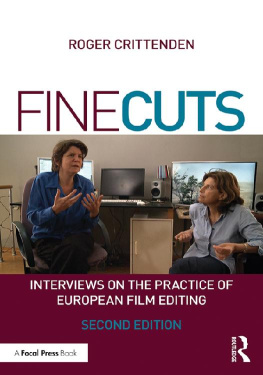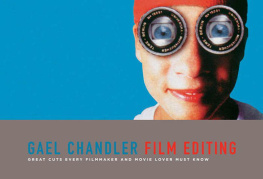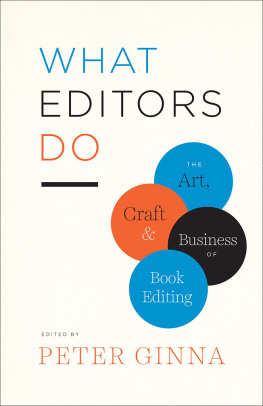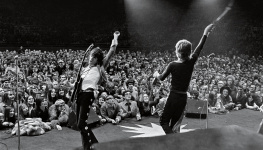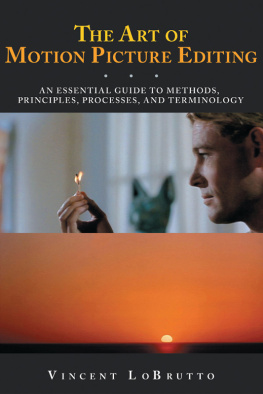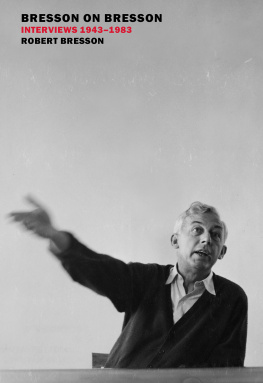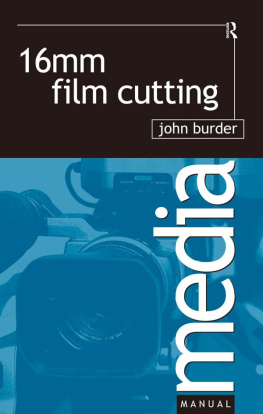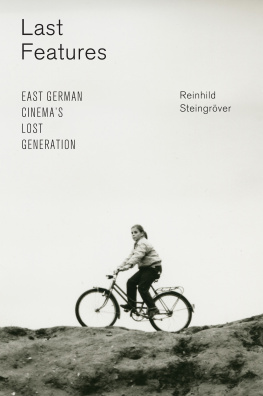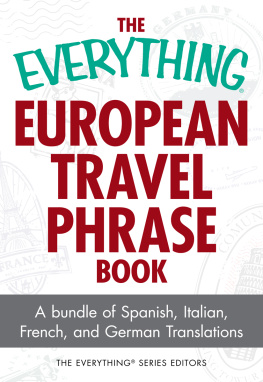Fine Cuts
In the expanded second edition of Fine Cuts, Roger Crittenden reveals the experiences of the greatest European film editors through his warm and perceptive interviews. This new edition builds on the foundations laid out in 2005, including interviews with the editors of films such as Day for Night, The Sacrifice, The Kid with a Bike, and Fanny and Alexander; new interviews with editors of such films as Tyrannosaur and The Other Side of Hope; and editors from a wider range of countries, including Austria, Belgium, Finland, Portugal, and Russia. The book now embraces all aspects of post-production, with insights into sound editing from Larry Sider, originator of the renowned School of Sound, and music composition from Oscar winner Dario Marianelli (Atonement).
Editors relate their experiences with directors, including:
- Claire Atherton [Chantal Akerman]
- Mick Audsley [Terry Gilliam, Stephen Frears]
- Yann Dedet [Franois Truffaut, Claire Denis, Maurice Pialat]
- Marie-Hlne Dozo [Dardenne Brothers]
- Franois Gdigier [Patrice Chreau, Lars von Trier]
- Samu Heikkil [Aki Kaurismki]
- Sylvia Ingemarsdotter [Ingmar Bergman]
- Tony Lawson [Nicolas Roeg, Stanley Kubrick, Neil Jordan]
- Michal Leszczylowski [Andrei Tarkovsky, Lukas Moodysson]
- Roberto Perpignani [Orson Welles, Bernardo Bertolucci, Taviani Brothers]
- Mary Stephen [Eric Rohmer]
Each interview also includes a list of cited and notable films for further study. An online eResource contains additional interviews with editors Sabine Mamou, Agns Guillemot, and Nino Baragli.
After a distinguished career at the BBC, Roger Crittenden was recruited to the new National Film and Television School as Head of Editing and later became Director of the MA program. While with the NFTS, he taught in Moscow, Mexico City, Manila, Copenhagen, Singapore, Brisbane Australia, and in Cuba. In 2014 he was given the first ever CILECT International Teaching Award for his outstanding contribution to media pedagogy. More recently, he was appointed Adjunct Professor of Film at Griffith University in Brisbane, Australia. Roger is the author of two books on editing, as well as a book on Truffauts Day For Night for the British Film Institutes Film Classic Series.
Second edition published 2018
by Routledge
711 Third Avenue, New York, NY 10017
and by Routledge
2 Park Square, Milton Park, Abingdon, Oxon OX14 4RN
Routledge is an imprint of the Taylor & Francis Group, an informa business
2018 Taylor & Francis
The right of Roger Crittenden to be identified as the author of this work has been asserted by him in accordance with sections 77 and 78 of the Copyright, Designs and Patents Act 1988.
All rights reserved. No part of this book may be reprinted or reproduced or utilised in any form or by any electronic, mechanical, or other means, now known or hereafter invented, including photocopying and recording, or in any information storage or retrieval system, without permission in writing from the publishers.
Trademark notice: Product or corporate names may be trademarks or registered trademarks, and are used only for identification and explanation without intent to infringe.
First edition published by Focal Press 2006
Library of Congress Cataloging-in-Publication Data
Names: Crittenden, Roger.
Title: Fine cuts : interviews on the practice of European film editing /
Roger Crittenden.
Description: Second edition. | New York : Routledge, 2018. | Includes index.
Identifiers: LCCN 2018004375 | ISBN 9781138201989 (hardback) |
ISBN 9781138201996 (pbk.) | ISBN 9781315475134 (e-book)
Subjects: LCSH: Motion picture editorsEuropeInterviews. | Motion
picturesEditing.
Classification: LCC TR849.A1 C73 2018 | DDC 778.535092/2 [B]dc23
LC record available at https://lccn.loc.gov/2018004375
ISBN: 978-1-138-20198-9 (hbk)
ISBN: 978-1-138-20199-6 (pbk)
ISBN: 978-1-315-47513-4 (ebk)
Typeset in Times New Roman
by Apex CoVantage, LLC
I wish to express my sincere gratitude to all contributors, new and old, for their generosity in being part of this venture.
I am especially grateful to Tatiana Tursunova-Tlatov, Head of International Relations at VGIK, the Russian Film School, for sending me images and information relating to Esther Tobak, and for arranging and translating the interview with Olga Grinsphun; to Joanna Hogg and Adam Roberts of A Nos Amours for introducing me to Claire Atherton, and to Claire herself for her hospitality in Paris; to my old friend Yann Dedet for encouraging me to contact Katharina Wartena, and letting me see the film she made about him at work; to another old friend Sylvia Ingemarsdotter for sourcing the text of the encounter between Ingmar Bergman, herself, and Swedish Film Editors, and for arranging a translation by Axel Grigor: to my newer friend Luis Zeferino for suggesting Joo Braz; to Paul Seed for his generous tribute to, and photographs of, Dave King; to Mick Audsley, Johnathan Morris, and Dario Marianelli for their individual hospitality; to Larry Sider for his crucial contribution; and to Walter Murch, who has kindly allowed his original foreword to be reprinted.
I have taken the opportunity afforded by this second edition to represent both sound editing and music composition. The editors I have added cover television as well as cinema, documentary alongside fiction, and a more eclectic range of form and content.
In response to feedback I have included suggestions for films to view. The films relate both to the work of the individual and to the films and filmmakers whom they admire.
I dedicate this edition to the memory of Dave King. He was the best of friends, and his memories are a perfect conclusion to the book.
Note
As with the first edition, each response has depended upon the nature of our communication. While considerable editing has been necessary, I have avoided molding them into a mono form, preferring to present them as they have been submitted to me. This means that they vary from the transcript of a face-to-face encounter, to the result of extensive correspondence, to a personal statement.
Film is the only art whose birthday is known to us.
Bla Balzs
The motion picture was born in Edisons New Jersey laboratory in 1889 and spent an innocent childhood at fairground sideshows around the world, amusing and astonishing audiences with its one tricksingle-shot representations of events like The Sneeze , The Kiss , Train Arriving at the Station , and Workers Leaving the Factory . Then around 1903, at age fourteen, it unexpectedly discovered the intoxicating and almost sexual power of montage. What emerged out of this adolescence, as a butterfly out of its chrysalis, was cinema. The construction of a coherent and emotional story from discontinuous and sometimes conflicting images is the fruitful paradox that lies at the heart of the equation:
MOTION PICTURES + MONTAGE = CINEMA.
We have the testimony of Edison and the Lumire brothers, American and European inventors of the mechanisms that made motion pictures possible, but the voices of those who invented the art of montage, which made cinema possible, are long lost. And they were largely European, anticipating developments in America by a couple of years. How did G.A. Smith, in 1900, arrive upon the idea of the close-up in Grandmas Reading Glass ? Or James Williamson, in 1901, the idea of action continuity across various locations in Fire! ? We simply dont know. How were these basic ideas elaborated and refined by Melis, Mottershaw, Haggard, Porter, and others? There are some interviews with the American director D.W. Griffith, and the books on theory written years later by Russian directors Eisenstein and Pudovkin. But as for what actually took place in the editorial trenches in the first two decades of the 20th century, we have only the most fragmentary circumstantial evidence, and in 1924 Balzs was already mourning the lost opportunity.

